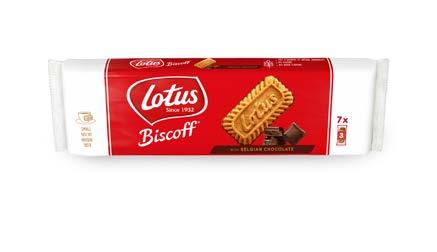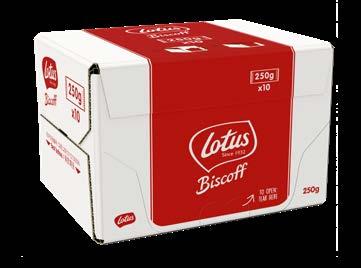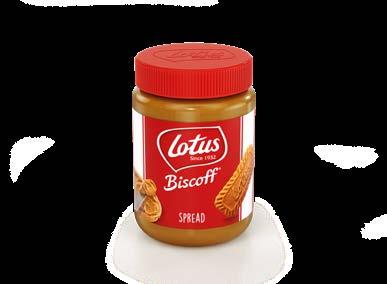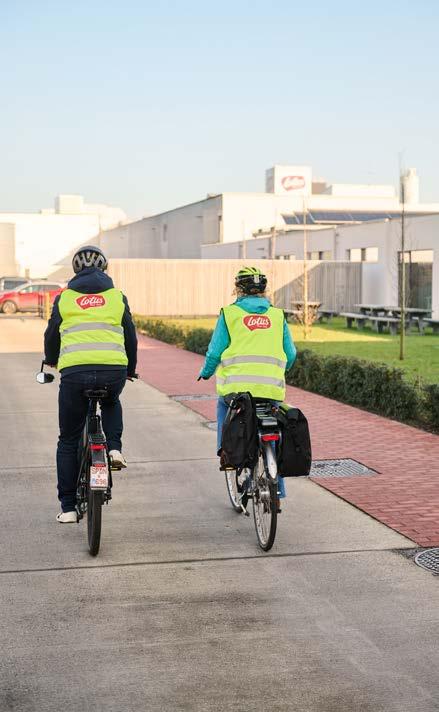
12 minute read
ENVIRONMENT: 2022 AMBITIONS & ACHIEVEMENTS
Lotus Bakeries is committed to the environment and the fight against global warming. We aim to reduce our ecological footprint in everything we do.
LOTUS BAKERIES’ AMBITIONS WITHIN THE ENVIRONMENT PILLAR FOCUS ON TWO DOMAINS THAT IT CONSIDERS MOST RELEVANT WITHIN ITS ACTIVITIES:
Advertisement
SUSTAINABLE PACKAGING
CARBON FOOTPRINT
1 The recyclability rate is the average technical recyclability of the packaging of all Lotus Bakeries brands by the end of 2022. It takes into account consumer packaging, distribution packaging and transport packaging. The technical recyclability rate is determined per packaging component on the basis of state-of-the-art design guidelines for recyclability (Ceflex, Recyclass). The average technical recyclability is a weight average, based on the packaging weight of each packaging component.
2 This concerns residual waste, production waste, grease, paper and cardboard at our owned sites. Tonnes produced includes the produced volumes of margarine plant.
3 As from 2022, this includes company vehicles from the site in Comines.
4 Following an analysis within the ESG project, the calculation of the external consultant was refined. The additional CO2e emissions were compensated with additional certificates so that 100% CO2 neutrality was maintained.
Sustainable Packaging
LOTUS BAKERIES’ VISION OF PACKAGING
1. We only want to offer our consumers products of the highest product quality and with a superior taste experience.
2. That is why we must protect our products: packaging allows us to combat food waste and guarantee food safety.
3. We aim to make our packaging as sustainable as possible and are committed to reducing our packaging carbon footprint.
In this context, Lotus Bakeries has formulated a packaging strategy that focuses on the reduction of packaging, using innovative design and investment in circularity.
Our commitment
Lotus Bakeries is committed to designing all its packaging for all its brands to be technically recyclable by 2025.
The purpose of our packaging is to protect the product and guarantee food safety. Both en route to the retailer and from the shop shelf to the consumer’s pantry, up to the time of consumption. To guarantee the taste experience and product quality, we must package our product to create a barrier against external influences.
High-quality packaging also ensures that Lotus Bakeries’ products have a longer shelf life and therefore helps prevent food waste, an issue as equally concerning as packaging waste. It is estimated that 1/3 rd of food products produced globally is lost through food waste, mainly at the point of sale and once it reaches the consumer.
At the same time Lotus Bakeries recognises the problems relating to the use of packaging, including marine pollution, carbon emissions and the use of non-renewable resources. Lotus Bakeries shares this concern and is keen to accept its responsibility in making the transition from the current linear economy, where packaging is produced, used and thrown away, to a circular economy, in which materials are kept in circulation.
Reduce What We Use Design For Tomorrow Aim For Circularity
Reduce what we use
The ideal packaging contains as little packaging material as possible, without loss of flavour or freshness. In 2022, Lotus Bakeries continued its efforts to innovate its packaging, with the goal of using as little material as possible. In so doing we pay the utmost attention to ensuring a superior taste experience for the consumer while minimising food waste. There is a delicate balance between using as little material as possible for the environment and yet enough material to be able to fully protect our products.
In 2022, Lotus Bakeries was able to realise a number of projects to further limit the packaging weight it brings to the market.
Through various reductions, across the entire product portfolio, a total of approximately 1,757 tonnes of packaging was saved in 2022 compared to 2021 in the different material types and packaging categories. Less material also means less weight and volume, which in turn has a positive effect on reducing container transport and the related CO2 emissions.
Reduction in thickness and size of plastic packaging
In 2022, we also continued to look for ways to minimise the packaging weight placed on the market.
For example, Lotus Bakeries succeeded in making the Lotus® Biscoff® 2-piece packaging even thinner in 2022, without compromising on quality. After extensive research, a suitable method was found to implement a similar reduction on the larger packages as well. The rollout for this is scheduled for 2023. The bundle packaging around the Lotus® Biscoff® chocolate was also made even thinner in 2022.
In 2022, Lotus Bakeries was able to make the nākd bar wrappers sit even tighter around the bars. Such a measure also ensures that less packaging material is required per bar.
The BEAR wrappers were also changed to recyclable material in 2022, which significantly reduces the amount of packaging brought onto the market.
Thinning of cardboard packaging
Besides plastic, Lotus Bakeries also tries to use as little cardboard as possible. Where possible, recycled paper fibres are used. In 2021, thinner materials were already being used for the cardboard packaging of the Lotus® Biscoff® 300-piece box. Based on that success, the cardboard packaging containing the Lotus® Biscoff® 250gx10 was also optimised in 2022. This cardboard also now contains thinner materials, which means it weighs less and a larger number of boxes can be put on a transport pallet. As a result, significantly fewer tonnes of cardboard are placed on the market every year and 31 less trucks are needed to transport the cardboard to the factory, which has a positive impact on both CO2 emissions and water consumption.

Reduction of glass per jar
After extensive research, Lotus Bakeries succeeded in using thinner materials for the glass jars of Lotus® Biscoff® spread in 2022, without compromising on taste and freshness.
This optimised packaging has a positive impact on CO2 emissions and energy consumption thanks to its lighter weight.

Design for tomorrow
All packaging recyclable by 2025
The recyclability of packaging starts with its design. We constantly explore sustainable and innovative packaging materials to increase the recyclability of our packaging and at the same time support the recycling process. We use objective eco-design guidelines to make our packaging recyclable, including CEFLEX and RecyClass.
The technical recyclability rate is calculated as follows: the ratio of the total weight of the technically recyclable packaging is compared to the total weight of packaging of all our brands that we bring to the market as per the end of 2022.
This takes into account consumer packaging, distribution packaging as well as transport packaging. This technical recyclability rate is determined per packaging component on the basis of state-of-the-art design guidelines for recyclability (Ceflex, Recyclass). The weight of each packaging component is taken into account.
All efforts that contribute to reducing the packaging weight we bring to market affect this percentage. This also includes reducing the weight of glass, a recyclable packaging.
Therefore, the technical recyclability rate has remained stable at 97%, despite the fact that a switch was made for a number of additional products from non-recyclable packaging to recyclable packaging. The significant reduction in the weight of the Lotus® Biscoff® spread glass jar explains this stable percentage.
Recyclable BEAR wrappers
A significant achievement for 2022 is related to the brand BEAR from the Lotus™ Natural Foods product portfolio. The BEAR wrappers were changed from a non-recyclable packaging to a recyclable material.
Projects to close the gap to 100% recyclability
In 2022, a Close-the-GAP-action plan was drawn up to close the gap and achieve the 100% technical recyclability of all product packaging in the Lotus® Biscoff® range, the Lotus™ Natural Foods range, and for the Local Heroes.
This action plan identifies all the steps to be taken to achieve the set objective by 2025.
Aim for circularity
Since we design with recyclability in mind, we believe it is vitally important to evolve into a circular economy.
Use of recycled material
We contribute to this by using recycled content wherever possible, without losing sight of the requirements of quality and functionality.
We always strive for what is technically the maximum possible:
- For glass, we use 58% recycled material, the maximum achievable without visual side effects.
- For cardboard packaging this is 80%.
Circular economy partnerships
Lotus Bakeries also supports various collection and recycling systems, including Ceflex, The Flexible Plastic Fund. Lotus Bakeries contributes to ‘Extended Producer Responsibility’ systems in various European countries.
Raising awareness among our consumers; together we are reducing the plastic waste mountain Lotus Bakeries has informed consumers more explicitly about its packaging recyclability since 2021. This is done by means of a custom icon that reads ‘recycle me’, combined with the slogan ‘Let’s care for our planet together’. That is how Lotus Bakeries wants to create even more awareness and encourage consumers to sort the packaging correctly so that it can actually be recycled.
This icon will appear on every recyclable packaging, in the countries where that packaging can effectively be recycled.
This ‘recycle me’ icon is an initiative undertaken by Lotus Bakeries and is not related to any official government authority or certification body.
CARBON FOOTPRINT CO 2-NEUTRALITY
Our scope 1, 2, 3 emissions
Climate change is one of our greatest global challenges.
Scope 1 Emissions Scope 2 Emissions Scope 3 Emissions
For the calculation of our scope 1 emissions we take into account all GHG.
The major part of our Scope 1 emissions relates to the use of natural gas.
In 2022, our scope 2 emissions only included purchased electricity.
In 2021-2022, we conducted a screening of our upstream and downstream scope 3 emissions
The scope of the screening exercise covered 90% of all our upstream and downstream activities.
Lotus Bakeries is carbon neutral
The result of the screening exercise of scope 3 indicated that more than 90% of our total emissions comes from scope 3. Analysis showed that more than 80% of our scope 3 emissions relate to raw materials.
Partnership with CO2 logic, South Pole Group
For more than 10 years, Lotus Bakeries has been working with CO2logic, the Belgian pioneer in climate action, to monitor our scope 1 and 2 emissions. Since 2021, CO2logic has been part of the South Pole Group, the international leader in climate and environmental services based in Switzerland.
Lotus Bakeries’ own sites are carbon neutral. This has been the case since 2015 and remains so in 2022.
All our scope 1 and 2 emissions
are offset with certificates.
For 2022, we received a CO2-neutral label from CO2logic, a South Pole Company, for all our own sites.
SBTI COMMITMENT: NET-ZERO BY 2050
Lotus Bakeries signed the Commitment Letter from the Science Based Target initiative (SBTi). A copy of the letter is published in the ESG compilation report.
The ESG compilation report can be found on the Lotus Bakeries website: https://www.lotusbakeries.com/reporting-disclosure
Science Based Target initiative (SBTi)
The SBTi is a collaboration between Carbon Disclosure Project (CDP), UN Global Compact, the World Resources Institute (WRI) and WWF.
SBTi has developed the first global science-based standard for organisations to set reduction targets to limit global warming to 1.5 degrees Celsius above pre-industrial levels and achieve net-zero CO2 emissions by 2050.
Reduction objectives must include all GHG (greenhouse gases) emissions from scope 1, scope 2 and scope 3.
Scope 3 includes emissions from all our upstream and downstream activities.
For Lotus Bakeries, the upstream activity mainly comes from the purchase of raw materials. Since our raw materials come from agriculture, the FLAG Target-setting Guidance also applies to the raw materials and ingredients we purchase, which requires us to set both a specific FLAG target and a general scope 3 target for the emissions associated with our purchasing activity.
In order to achieve the reduction of scope 3 emissions, we will work closely with our suppliers.
Carbon Footprint Reduction
Lotus Bakeries is aware of the need to look critically at its carbon footprint in the fight against global warming and climate change in general.
Transition to more sustainable energy sources
Further investments were also made in solar panels at all Lotus Bakeries sites in Belgium and at the site in South Africa.
The expansion of the headquarters in Lembeke, the ‘House of Biscoff’, inaugurated in October 2022, was designed according to climate-friendly standards and is a so-called ‘BEN building’ (BijnaEnergie-Neutraal = Almost-Energy-Neutral) with an E-level under 50. The new building includes a geothermal heat pump, LED lights, intelligent energy monitoring, its own PV production of green electricity on the roof and façade and variable ventilation flows according to CO2 measurements per room. Rainwater is also captured and optimal seepage of water into the ground is ensured.
Transition to more sustainable logistics
Reduction of container transport through local production
In 2022, the North Carolina plant in the United States was expanded to include a new production hall. That second hall now has two operational Lotus® Biscoff® production lines. The capacity increase in the United States will make the continent more self-sufficient for local demand of Lotus® Biscoff® cookies. The plant in the United States is also sourcing its own raw materials and packaging locally and hence more responsibly and sustainably.This capacity expansion brings significant ecological benefits by avoiding container transport and the related CO2 emissions. The total capacity invested to date in the United States avoids 1,500 containers per year travelling from Belgium to the United States.
In August 2022, it was announced that Lotus Bakeries has plans to start a Biscoff® production facility in Asia to further support its growth ambitions for Lotus® Biscoff®. The rationale for a third Lotus® Biscoff® plant is straightforward. The new plant will provide the necessary additional capacity for the Group, bring fresher cookies to the consumers, allows to respond more quickly and better to local opportunities and aside from transport costs also reduces the environmental footprint of the company.
Multimodal transport in Europe
In 2022, in cooperation with the Vlerick Business School, it was investigated which alternative means of transport could be used in Europe to get Lotus Bakeries products to end customers. A combination of rail, ship and truck often offers a more environmentally friendly solution than only road transport.
All logistics flows for Lotus Bakeries in Europe were mapped out in the study. Based on this analysis, alternative and more sustainable routes and modes of transport were identified.
Both its effectiveness and feasibility as well as its cooperation with potential partners were evaluated. The first pilot projects were tested in the Czech Republic, Italy and the United Kingdom.
These tests and new collaborations proved to be very successful. After the positive results, implementation of the multimodal system was started in the three aforementioned countries. The next steps are to further expand the multimodal transport plan to other European countries where possible.
Greening of employee mobility Company cars
The transition to a greener fleet has already been implemented in various countries via the car lease policy.
The largest fleet is located in Belgium. Since 2022, our employees in Belgium can only choose a fully electric vehicle as company car and electric charging stations are provided to further facilitate this use. Today, 15% of the Belgian fleet are electric cars. This percentage will increase signficantly once the outstanding orders in 2023 will be delivered.
In anticipation of this, additional charging stations were installed on the Belgian sites and in-home charging points were installed.
Bicycle lease
Furthermore, there is a bicycle leasing scheme in place for Lotus Bakeries employees in Belgium and the Netherlands. In Belgium, this programme has been up and running for several years. Employees who sign up for this bicycle leasing scheme are committed to coming to work by bicycle for a minimum number of days a year.
More and more enthusiastic employees are choosing to purchase a bicycle through this program. This is not only good for the employees’ health, but also has a positive effect on CO2 emissions.

Avoiding Deforestation And Sustainable Sourcing
Combating deforestation
Lotus Bakeries is committed to avoiding deforestation as much as possible by purchasing its raw materials and ingredients sustainably. This reduces deforestation in our supply chain. We believe that avoiding deforestation and conserving local ecosystems are of great importance in the fight against climate change. Farmers need to cultivate their raw materials in a sustainable way.
Sustainable sourcing
Lotus Bakeries is aware of the negative impact certain crops can have on the environment as well as on the communities living in the areas where those crops are grown.
Palm oil
All palm oil that Lotus Bakeries uses in its products is sustainably sourced. All Lotus Bakeries sites that use palm oil have also obtained the RSPO certificate.
Cocoa
100% of the cocoa butter and cocoa mass used in our Lotus® Biscoff® chocolate has been certified by the Rainforest Alliance. This is a recognised quality mark for working conditions, the environment and nature conservation for products sourced from rainforest regions.
Wood and paper
Today, 78% of the cardboard packaging of our brands are FSC, PEFC, or SFI-certified with the guarantee that the products come from sustainably managed forests. This preserves biological diversity and combats deforestation.
Local sourcing
We also purchase our raw materials and packaging materials locally to a maximum extent. This means we purchase the greater part of our raw materials on the same continent as were we use these in our production. We continuously strive to keep the distance between grower and our production site as short as possible.
Water Management
Climate change and industrialisation put pressure on the availability of water, which increases the importance of efficient water management.
Lotus Bakeries recognises that the sustainable use thereof is crucial. Water is a major source of health and well-being worldwide.
Monitoring
As part of its internal operational reporting, Lotus Bakeries reports on its water consumption.
Since 2022, water consumption has been among the standard KPIs that all production facilities report monthly. Based on these reported figures, Lotus Bakeries monitors the water usage across the various facilities.
Lotus Bakeries used in its production sites 89,578 m 3 water.
In the new ‘House of Biscoff’ in Belgium, technology is provided to collect rainwater and a well water filtration system has been installed. This well makes it easier for water to seep into the ground, meaning it is more evenly and better moisted. This contributes to a good groundwater balance.








